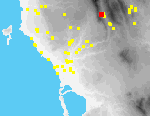 A02 Metaxada Kalopsana (1)
A02 Metaxada Kalopsana (1)
The site lies ca. 1.4 km. SSW of Metaxada village, on the top and N, E and S slopes of a spur extending E from the Aigaleon ridge into the Metaxada valley[101.22], of which it offers a fine view. This spur, linked to the ridge by a narrow neck, marks a route - taken by a now overgrown track - to a saddle over the ridge between the sections called Adtilaris (to the S) and Analipsi (to the N). The spur is bordered to the N and S by ravines. NE of the flattish top of the spur are conglomerate vertical outcrops[091.31][013.06.lbl]. Thickets of maquis and trees now cover much of the site, although parts of the top of the hill and its eastern slopes were burnt in 1991. The amount of terracing suggests the area has been intensively cultivated and the present owner reported that the land was intensively cultivated and grazed as late as the 1950s, although the numerous E and S-facing terraces are today weedy and uncultivated, but still used for grazing. There are also elaborate check dams on the E slopes of the ridge NW of the site. The terrace walls are built in some cases from very large chunks of cut conglomerate bedrock[091.28] (some blocks up to 1 m. L.), although there are also smaller rubble walls. Some of these terraces stand as high as 3-4.5 m. Many other large chunks of conglomerate are strewn across the site.
98% of the pottery from the site is MH-LH coarse wares, most not more closely datable. There are very few shapes. Pithos fragments are quite common, including bases and raised bands of rope decoration. There are fragments of several LH I-II plain fine ware vessels, but only one sherd of definite LH III date (LH IIIA). Two pedestalled feet resemble Geometric (?) example found at L2 (Stou Farfa Ti Rahi).